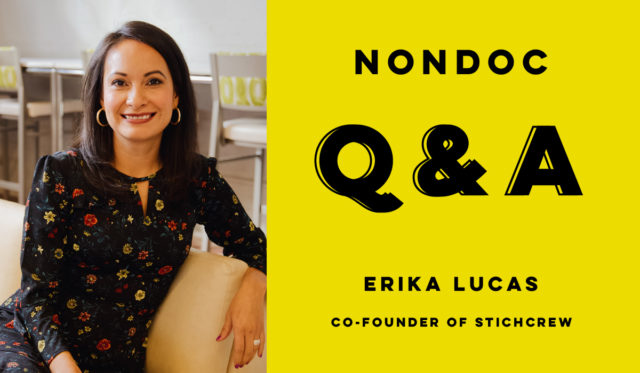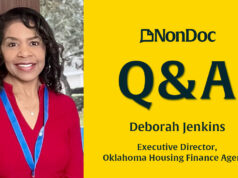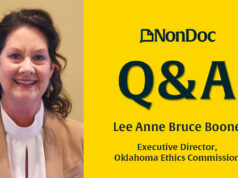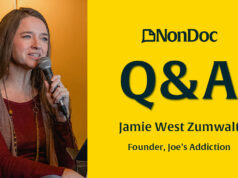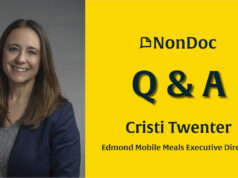
According to the United State Census Bureau, only about 18 percent of businesses are minority-owned and about 20 percent are owned by women.
While the number of these businesses is increasing, women and minority entrepreneurs still face a host of special challenges. For instance, Black and Latino entrepreneurs received only 2.6 percent of venture capital funds in 2020.
Edmond resident Erika Lucas hopes to change these numbers. Her company, StitchCrew, aims to make the world of entrepreneurship more equitable by assisting businesses owned by women and people of color and helping give them access to networks and capital. Each year, StitchCrew picks two sets of 10 startups to work with and support.
Lucas was born in Mexico to a family of entrepreneurs who started businesses “not because it was cool, not because it was sexy or because they wanted to end up on the cover of Forbes Magazine,” Lucas said at a TedxOU in 2019. “They started businesses out of a need to provide for their family.”
She began her career in Mexico, helping multinational companies offshore before immigrating to the U.S. to work as global director of the Oklahoma Department of Commerce, where she spent six years. She then worked for a private equity firm with investments in the U.S. and Europe.
Lucas started StitchCrew with her husband, Chris, in 2017. In this Q&A, Erika Lucas discusses her work to increase diversity and representation in entrepreneurship. The following conversation has been edited slightly for clarity and style.
You work to bring entrepreneurship opportunities to women and people of color. You were born into a family of entrepreneurs, and you became one yourself. How do share your experience with others?
I do as much one-on-one mentoring as my schedule allows, but where we’ve really been able to share our networks and experience is through an accelerator program we run in partnership with the Oklahoma City Thunder.
Since the launch of the program, three and a half years ago, we’ve helped more than 70 companies as they launched and scaled their companies. Rather than just learning from us, we’ve managed to build a community of founders who continue to learn with and from each other. They are constantly supporting one another and are paying it forward by coaching new entrepreneurs in the community.
How has the pandemic affected the way you do your job?
Like everyone else, we had to shift a lot of our in-person events and workshops to virtual, but, because we support entrepreneurs in different parts of our region, we already had a system that enabled us to support distributed teams virtually.
What have been the barriers to diversity and representation in the field? What are some solutions?
Women and entrepreneurs of color are actually starting businesses at a faster rate than their peers. The problem is, many of these businesses are not reaching scale.
Prevailing systems of established regulations, societal norms, systemic and structural barriers make calling a business particularly challenging for women and people of color. This is particularly true when it comes to accessing right-sized, right-type capital. Women and entrepreneurs of color face significant challenges when trying to access sources of capital, such as loans, venture capital, angel investments and debt financing. As a result, many of them are not well capitalized and have cash flow challenges to support growth.
We need more right-sized capital options so first-time entrepreneurs don’t feel trapped into believing they either have to be VC (venture capital) backable or go home. We need to increase awareness of the different types of capital available so entrepreneurs can identify which type of capital providers are best suited for them. This will increase their chances of getting funded.
We also need to increase the number of women and BIPOC investors, fund managers and capital providers — that is where the lack of representation is astonishing. Less than 10 percent of investors are women and less than 2 percent are Black or Latinx.
What advice do you find yourself repeating to women and people of color wanting to become entrepreneurs?
Don’t build your company to fit the VC model. Build it to fit the needs of your customers.
What opportunities are the most accessible to women and people of color? How do they find them?
There is an abundance of programming and resources out there for entrepreneurs both in-person and online. It really just depends on the type of business you are building. Are you a high-growth potential business or a Main Street business? Nothing superior about one or the other, just research and know the difference so you can look for adequate support. Identify what it is that you need: Is it access to capital? Network/community? Mentorship? Google or YouTube startup resources? Check out co-working spaces, community meet-ups/organizations, government agencies like the U.S. Small Business Administration, etc.
Ball or fine-point pens?
Rollerball pens.
What was your hardest moment of the past year? Most rewarding?
Not being able to see extended family for a long period of time in order to keep everyone safe. Spending more time with my girls and husband and learning to slow down.









